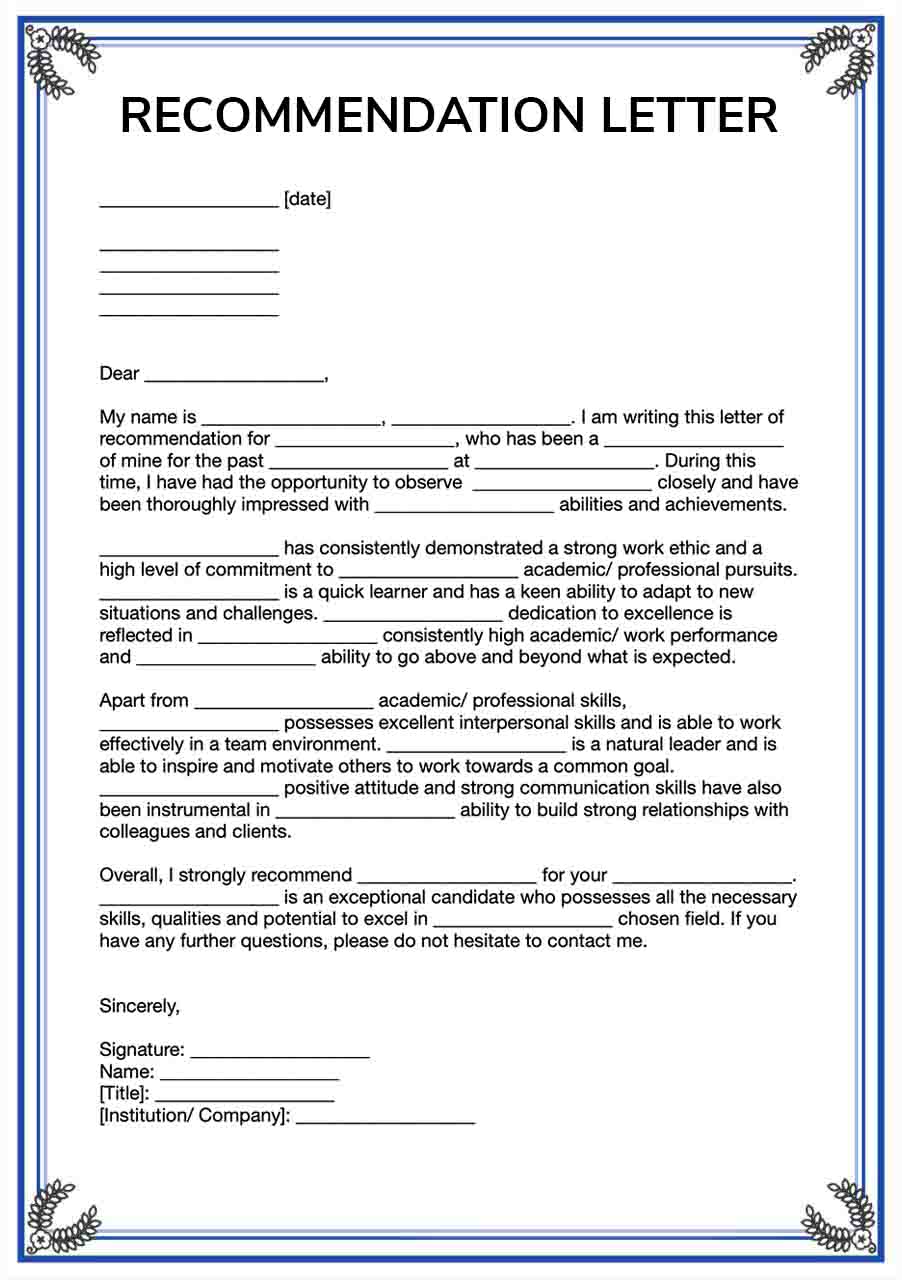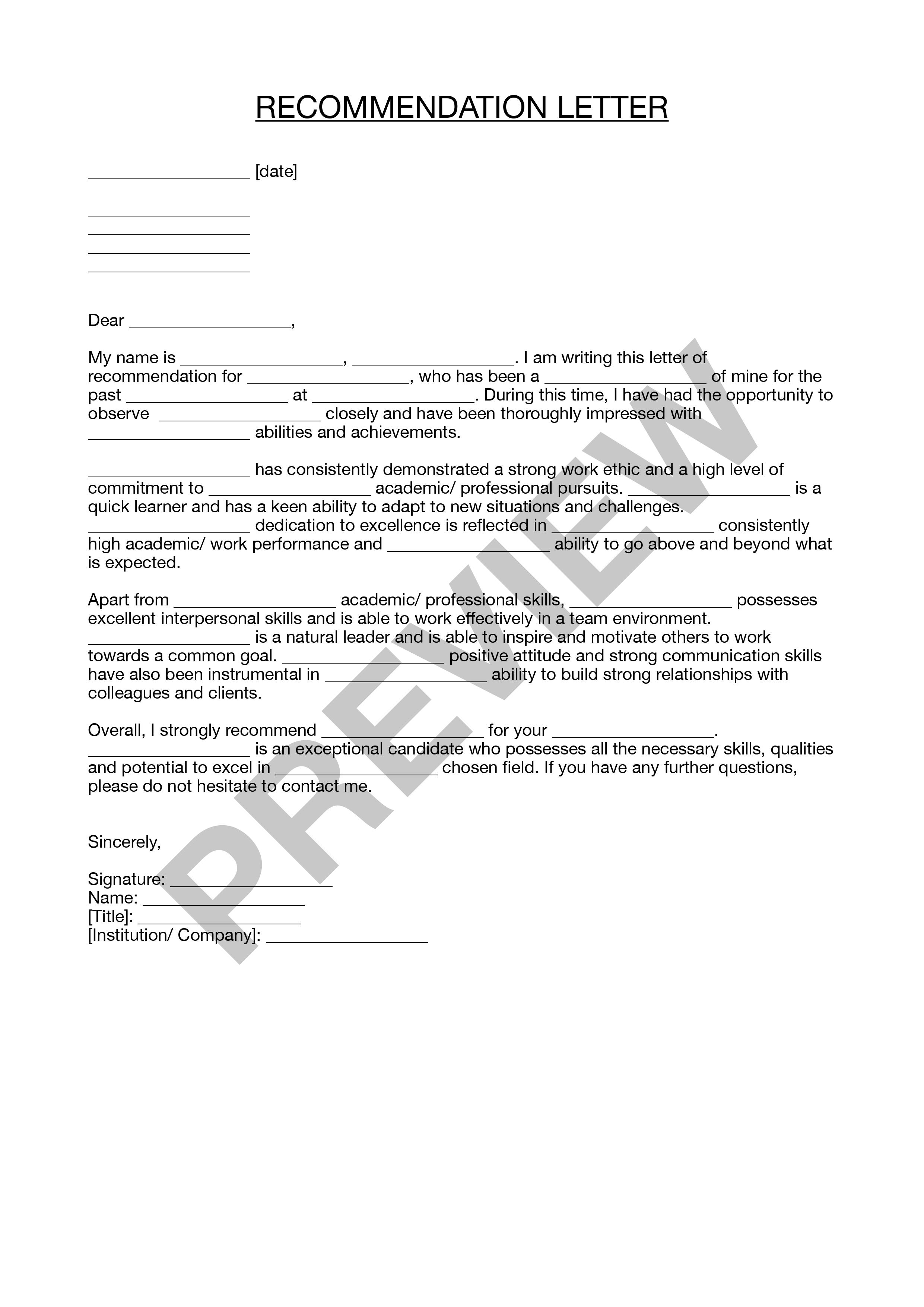Generate Recommendation Letter
A Recommendation Letter is a document that attests to someone's skills or character, typically used for employment or educational purposes.
What type of recommendation letter is being created?
Select one option belowLast Updated April 2023
What is a Recommendation Letter?
A recommendation letter is a document written by a person, usually someone in a professional or academic position, who knows the applicant well and can provide a positive evaluation of their qualifications, character, and abilities. It is typically required as part of the application process for jobs, internships, graduate school programs, and other opportunities.
The purpose of a recommendation letter is to provide an independent and credible assessment of an applicant's strengths and potential to succeed in the desired position or program. It can provide valuable insight into an applicant's character, work ethic, and abilities, and can also help to distinguish them from other candidates.
A good recommendation letter should provide specific examples that illustrate the applicant's skills and accomplishments, and should be written in a professional and objective tone. It should also be tailored to the specific position or program for which the applicant is applying.
Types of Recommendation Letter
There are several types of recommendation letter, each serving a specific purpose. Here are some common types:
-
Academic Recommendation Letter: This type of recommendation letter is usually written by a professor, teacher, or academic advisor, and is intended to support a student's application to a graduate program, scholarship, or academic opportunity.
-
Rental Recommendation Letter: A rental recommendation letter is a document written by a landlord or property manager to provide a positive review of a tenant's rental history. It typically includes information about the tenant's payment history, length of tenancy, and overall behavior as a renter. The letter serves as a reference for a tenant looking to rent a new property and can help demonstrate their trustworthiness and reliability as a renter.
-
Employment Recommendation Letter: This type of recommendation letter is usually written by an employer, supervisor, or coworker, and is intended to support a job applicant's application for a new position, promotion, or other professional opportunity.
-
Personal Recommendation Letter: This type of recommendation letter is usually written by a family member or close friend, and is intended to provide support for an individual's personal goals, such as a loan application, immigration application, or personal development opportunity.
-
Graduate School Recommendation Letter: This type of recommendation letter is written by a professor or academic advisor to support a student's application to a graduate program, such as a master's or PhD program.
-
Scholarship Recommendation Letter: This type of recommendation letter is written by a professor, academic advisor, or employer to support a student's application for a scholarship or other financial aid opportunity.
These are just a few examples of the many types of recommendation letters that exist. The content and format of a recommendation letter may vary depending on the specific context and purpose for which it is being written.
What are the key elements that should be present in a Recommendation Letter?
When writing a recommendation letter, there are several key elements that should be included:
-
Introduction: Begin the letter by introducing yourself and explaining your relationship to the person you are recommending. This should include the person's name, the capacity in which you know them, and how long you have known them.
-
Context: Provide some context for the recommendation. Explain why the person is seeking the recommendation and what the recommendation will be used for (e.g. job application, graduate school application, etc.).
-
Qualifications: Describe the person's qualifications, skills, and achievements. Be specific and provide examples of their strengths, accomplishments, and contributions. Use concrete and specific language to demonstrate the person's capabilities and achievements.
-
Personal qualities: Discuss the person's personal qualities, such as their character, work ethic, and values. Provide examples of how they have demonstrated these qualities in the past and how they will be an asset to the position or opportunity they are seeking.
-
Conclusion: Summarize the person's qualifications and personal qualities, and conclude by expressing your confidence in their ability to succeed in the position or opportunity they are seeking. Offer to provide additional information or answer any questions the reader may have.
-
Signature: End the letter with a professional closing (e.g. "Sincerely") and your signature. Include your contact information, such as your email address and phone number, so that the reader can reach out to you if needed.
Overall, the recommendation letter should be positive, specific, and tailored to the person and opportunity they are seeking. It should provide evidence of the person's qualifications and personal qualities, and demonstrate why they would be an excellent candidate for the position or opportunity they are pursuing.
From whom can you request a Recommendation Letter?
You can request a recommendation letter from individuals who know you well and can provide an honest and positive assessment of your qualifications and character. This may include former or current employers, supervisors, colleagues, professors, mentors, or other professionals who have worked closely with you and can speak to your skills, abilities, and personal qualities. It's important to choose individuals who can provide a comprehensive and insightful recommendation that is relevant to the opportunity or position you are seeking.
Frequently Asked Questions
When requesting a recommendation letter, it's important to be polite and provide all the necessary information, such as the application deadline and specific requirements for the letter. You should also offer to provide your recommender with any additional information that might be helpful, such as your resume or a brief summary of the position or opportunity you are seeking.
The number of letters of recommendation required varies depending on the position or opportunity you are seeking. Typically, you will be required to provide at least two or three letters of recommendation. However, it's always a good idea to check the specific requirements for the position or opportunity you are applying for.
A recommendation letter should include an introduction, context for the recommendation, qualifications, personal qualities, and a conclusion. It should provide specific examples of your strengths and accomplishments, and demonstrate why you are a good fit for the position or opportunity you are seeking.
The submission process for letters of recommendation may vary depending on the specific application or organization you are submitting them to. However, here are some general guidelines:
-
Read the instructions carefully: The application or organization may provide specific instructions on how to submit the letters of recommendation. Make sure to read these instructions carefully and follow them exactly.
-
Provide the writer with necessary information: If the application or organization requires the letters to be submitted directly by the writer, provide them with all necessary information, such as the deadline, the address or email of the recipient, and any other instructions or forms they need to fill out.
-
Check with the writer on their submission method: If you have been given the letters to submit yourself, check with each writer on their preferred submission method. Some may prefer to send a digital copy directly to you, while others may prefer to send it directly to the recipient.
-
Include necessary identifiers: Ensure that each recommendation letter includes your name, the name of the opportunity you are applying for, and any other necessary identifiers as specified by the application or organization.
-
Submit on time: Make sure to submit all letters of recommendation by the deadline specified in the application or by the writer. Late submissions may not be considered.
It is generally considered inappropriate to ask to see the recommendation letter before it is submitted. However, you can ask the writer to discuss the content of the letter with you, and to provide you with a copy if they are willing to do so.

